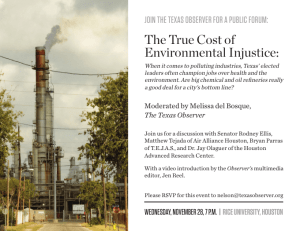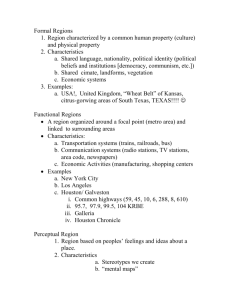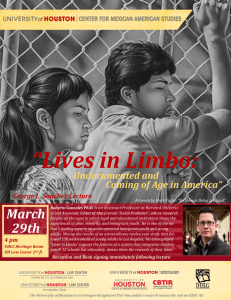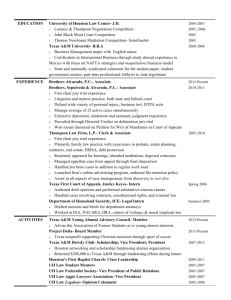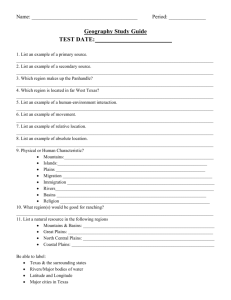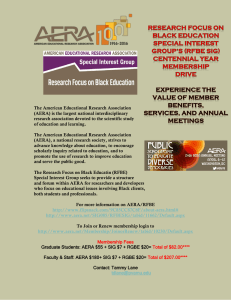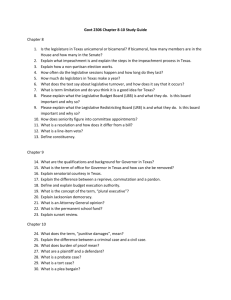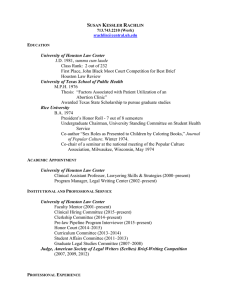Document 10868949
advertisement
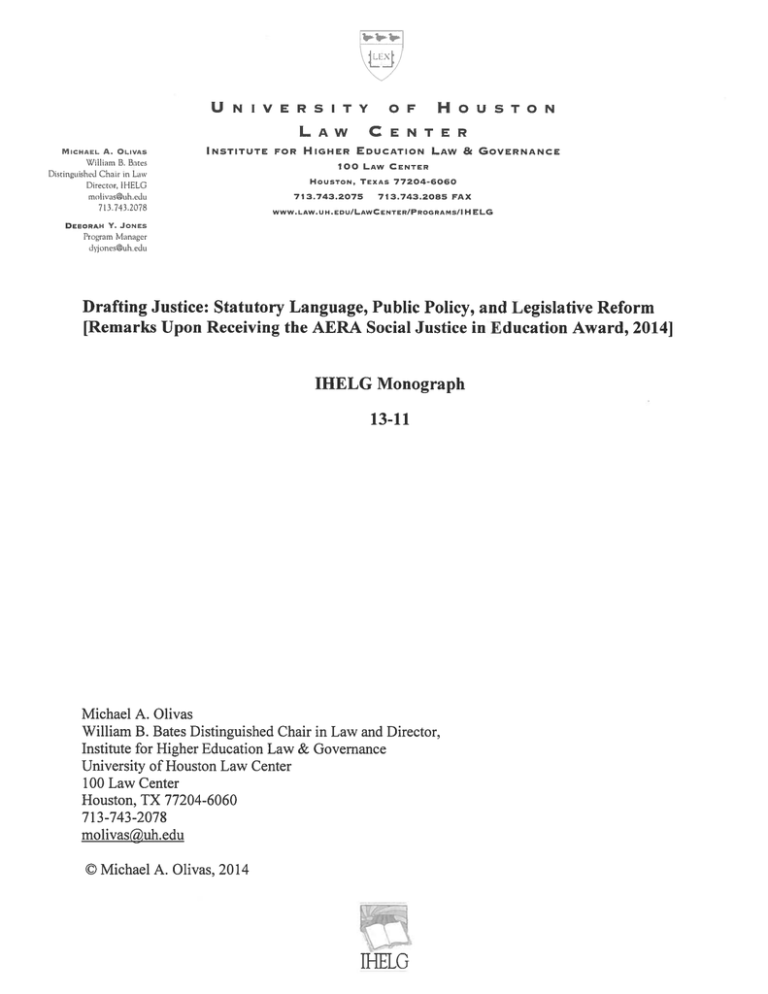
Drafting Justice: Statutory Language, Public Policy, and Legislative Reform [Remarks Upon Receiving the AERA Social Justice in Education Award, 2014] Michael A. Olivas, University of Houston Law Center When my dear friend and colleague Estela Bensimon called and left a home message on a cold Friday night in January, I did not answer the phone, as I was in my office—my official domicile for Voting Rights Act franchise purposes these days, even though the University of Houston and the City of Houston were both officially shut down due to ice, of all things, adding to the surreal nature of this whole exchange—so I did not get it right away. So I got an email message follow-up from her, asking me to call her about an important matter. Given some previous exchanges with her, I had thought a mutual friend was having legal problems or that something bad had happened. These days, I am right more often than I am wrong when I start from the worst premise. Even if she would have identified it as an AERA matter, I would have assumed the worse—perhaps that my proposal for a piddling amount of convocation money had been reconsidered and denied again. (In other words, art tracking life.) But it was an even more rare matter than my being awarded a grant from any funder: I had been chosen for the 2014 Social Justice Award from AERA, and I was expected to attend the Annual Meeting and give a lecture. I had not even known there was such an award, or didn’t until last year, when I heard that Jeannie Oakes had won it, so I had scoped it out and saw that several of my friends had been so honored. I could not attend her Lecture last year, as I had my own scheduled activities, so I had no real template about how to thank the Academy, and being nominated was the real honor, etc. I had not known I was being considered, although I have some unfounded, unprovable suspicions about possible nominators, once I learned that there was no binding oath that is administered to AERA members designating candidates. The true problem is not really false modesty--given some of the people who did receive the Association's convening travel grants--but my own inexperience at receiving honors, at least the kind that do not involve old age, which I am receiving increasingly. Lifetime achievement recognitions have come my way several times, even in my 50's, causing me to query my doctor about whether or not he was really telling me the truth. (He does, at a breathtaking pace and with way too much relish and detail and remonstrance.) In any event, if I am going to win any cash-free Award, being singled out for doing social justice is preferable to almost anything other than longevity. And it is funny, in the sense of odd/ funny, but I do not really see myself as setting out to do justice, any more than actors set out to make a bad movie or singers a bad album. Most good scholars live in our heads—I more than most—and as much as I love teaching, I teach to have an occupational platform for doing my research. I am aware that I have come to be known for what is often called "advocacy research" or "special pleading" scholarship, as my work often tends to be about the downtrodden and the helpless, especially the undocumented and underrepresented, but it is the opposite from what most people think: I do this not because I want to advocate, but because after very careful thought and reflection, I gravitate towards this type of scholarly work. That is, I do not choose this kind of work, but in a very real sense, it chooses me. I never know when my writing will be helpful to someone or become useful to a legislator or policy wonk or advocate or lawyer. Of course, I hope it is helpful or persuasive or provocative, but in a very real sense, I do not care if it is so. I confess that I often fashion extensive footnotes that turn out to help others, but that is not why I do it that way or spend the extra time and effort to make them discoverable to others. I am just trying to show my breadcrumbs and to make the sources more readily available so that others will see my logic, showing all my math work, the way that I was taught by my Catholic school arithmetic and algebra teachers so long ago. (I also figure I might get partial credit that way, as I did at Our Lady of Fatima grade school in my native New Mexico.) Showing the math, I have always figured, would reveal all the steps of my thinking, especially when I am writing to correct a record or establish something counter-intuitive. But I am being completely honest and embarrassed when I find it surprising that I am regarded as doing social justice. Don’t get me wrong, it surely is better than being thought of as not doing justice. It is just that it is not this impulse that accounts for my topics or my takes on various issues. Who would think so when they see the range of interests I have, from prepaid and Sec. 529 plans to deferred action and prosecutorial discretion to residency requirements to academic freedom? (And don’t forget my universally-admired and identified-with work on John Updike, Padre Martinez, and the Tribally Controlled Community College Assistance Act, my first law review article.) I have never lacked for topics, only the time to take them all where they would lead me, the way that I am told novelists are often surprised by their characters, who take twists and turns that magically flow without thinking in the careful plots, or the astounding ways that kids around us turn out so differently than you think they will (or should). So when a doctoral student asked me recently when I was having lunch with a group of Claremont Graduate University graduate students why I had chosen to write about the undocumented when I was a birthright US citizen and why I wrote so much about college attrition when I had been so focused and successful in navigating college, it caught me off guard. I cannot tell you why and how these ideas come to me-- it is often because, like Mallory's summits, because they are there, and I am curious, and because being a faculty member allows me to follow whatever rabbit hole I please, and because, because, because. After all, I would trust my oncologist no less simply because she had never had cancer, and I assume that many male physicians are excellent gynecologists. I surely do not believe that all criminal lawyers must have been convicted of crimes. However, all of this is just prelude, and protesting, probably too much—that exquisite Shakespearean turn of phrase about suspect motives and false humility. The truth is, I concede I am drawn this way due to the congeries of personal attributes, and the unlimited latitude I have in my pursuit of suitable topics. Of all the dimensions of a full life as a professor—the opportunities and rewards of teaching, mentoring, scholarship, consulting, professional service, advising—I will say that one small piece of my life has been more deliberate and purposeful, and I rarely see this side of service and social justice acknowledged, so I have chosen as my topic "Statutory Language, Public Policy, and Legislative Reform," with the tongue in cheek corollary "Being in the Right Place at the Right Time with the Right People," a truism that likely accounts for my own involvement and satisfaction with this piece of my work, statutory drafting and legislative reform, including its kissing cousin, regulatory reform and administrative law. If there is an advocacy-gene in me, it is likely one nurtured by experience and my training, especially my legal training. Just as it is always noteworthy how much children's willingness to learn turns on how much they like their teacher, a truly scary and life-affirming observation, but I am no different. I still remember the origin, insertion, and function of cat muscles I learned from my high school seminary biology teacher Fr. Sam Falbo; the nouns, verbs, and exceptions of Latin from Msgr. Peter Hill and Msgr. James James (truly); and the love for literature that has wrapped its arms around me throughout all my teachers, especially Msgr. Leonard Fick. But my love for and experience with statutory drafting arose from my One L Legislation course with Professor John Kramer, who not only imbued me with the beautiful tools of this important trade, but who was my best role model for law teaching and service to the profession. (He also personally introduced me to the late rock singer Harry Chapin, with whom he shared a commitment to social justice and feeding children.) My first law review articles grew out of GULC class papers, one a critical analysis of educational vouchers and one on the Tribally Controlled Community College Assistance Act, and then I started following the 1982 Plyler v. Doe Supreme Court case that happened partly in Houston and was announced the year I got to Houston. (Indeed, I attended its oral SCOTUS arguments, and have tried in my own way to honor the MALDEF attorney Peter Roos as a result.) I immediately saw the postsecondary implications of allowing these students to stay in K- 12 classes, and was determined to extend Plyler’s reach to colleges. This would require statutory analysis and legislative drafting. At OSU, I had successfully drafted a provision to allow citizen agricultural migrant workers to count three consecutive years towards the twelve-month durational requirement for in-state, resident tuition, so with this precedent, I began to lobby locally and in Austin for a similar provision for the undocumented, a state DREAM Act. This was a long and slow slog, one that even a number of Chicano and Chicana legislators resisted, as they felt that any displacement would likely occur against their own voting Chicano constituents. However, in 2001, I convinced a Houston state legislator, Rep. Rick Noriega, to champion the cause, leading to the first such provision, in accordance with the 1996 federal law that requires states to enact “state law” to allow the undocumented to gain resident tuition. (I also experienced some ironic schadenfreude when Governor Perry, who signed the Texas legislation into law, was beaten up by other Republican presidential candidates in the 2012 primaries, for his temerity.) This experience and the ramp up of the other states following the Texas lead have been among the most satisfying professional service projects I have undertaken in my life. (Others have included work on Sec. 529 Plans for college prepaid and savings plans, the Texas Top Ten Percent Plan which was enacted to open up UT-Austin and TAMU to more high schools than the small number of feeder schools sending their graduates to those colleges and as a counter to the effects of Hopwood; and graduate student legislation that precluded public post-baccalaureate programs in Texas from relying upon a single measure for admissions, such as a GRE score.) There have been other such legislative drafting accomplishments, but none so satisfying as these, especially the undocumented college tuition plans, which have now increased to 16, and which allowed me to consult, draft, advise, litigate, serve as an expert witness, and write about these issues, including a book project and about ten law review and refereed journal articles. Of course, a number of AERA members know that the percentage plan statute figured in the Fisher case, although it has been wrongly portrayed as a minority remedy, when over half of its participants have been Anglo students, in a state where less than a third of all K-12 students are white. As you start doing the autopsy of my career, you can see the various pieces, the spores and the connections, with advocacy interacting with legal work, leading to scholarship and an opportunity to blend my two teaching fields, Higher Education Law and Immigration Law and Policy. Very few scholars have worked at this intersection, and almost none longer than I have. (In fact, I was recently advised that I was the longest-serving immigration faculty member in the US, in terms of continuous teaching years. Without making a big point of it, I am also surely in the oldest cohort of Higher Education faculty and Higher Education Law faculty.) I have used the snout to the squeal of these issues for the many projects and articles. So when President Obama announced in June, 2012 that he would undertake a version of Deferred Action to cancel the removal and deportation of young DREAMers, I had just the month before finished a long article on the history and value of these Deferred Action policies. That day, I retrieved the article I had already submitted, got an extension, and wrote a 35 page Postscript to frame the Deferred Action for Childhood Arrivals (DACA), rushing (if that is the right word) into print as the first scholar to publish on the subject. A year and a half after the DACA program, well over half a million undocumented DREAMers have received permission to remain in the United States, Social Security Numbers, and work authorization. Luck counts, I have found, but you can improve your own luck by seeing the possibilities and by having insider knowledge of complex transactions. I also worked with a friend at UCLA’s Law School to organize law professors to write the Obama Administration and urge it to adapt Deferred Action, then lying fallow in a disappointing fashion, towards the immigration status of DREAMers. As a parenthetical, no week goes by where I am not contacted in one way or another by at least 2 or 3 DREAMers, and now DACA-recipients. I am also known as their scold, to my own mixed feelings. And I await their full entry into our community, after CIR. I end, as I began, grateful for this recognition, absolving all the nominators who so thoughtfully singled me out, and grateful for the many opportunities being a professor has afforded me. I am at the stage of my career where I am more delighted at my students’ achievements than I am at my own. It isn’t even a close call. When they publish, get elected to judicial or legislative office, start a law firm, start a family, win an important case, I feel very fulfilled. I delight in their returning to see me, their attending UHLC functions, their calls, their emails. Don’t get me wrong: I’ve also had a half dozen students (that I know of) disbarred or admonished. I cringe reading the Texas Law Journal disciplinary listings, the way my grandfather used to scan The Santa Fe New Mexican obituaries, to see how many primos or cuates he had lost. But most have done extraordinarily well, and I celebrate them today with you. Education is truly our society’s engine of upward mobility and stability. As satisfying as a recent book or article or testimony is -- and there is almost nothing better than laboring at the keyboard and bringing forth a piece into print -- I really believe that nurturing young professionals, especially young professors, is the highest calling, the most rewarding vocation. Now I know why my parents honored teachers; in our home, we often had our grade school teachers over to our house on important occasions, and they would sit in my father’s chair -- something I don’t even do to this day, more than a dozen years after his too early passing. Every year, he would accompany each of us to the first day of school, a ritual that to this day haunts me. (I am the oldest of ten children.) He would say to each new teacher: “I’m Sabino Olivas, and his teachers say my son Michael is smart but can be lazy. I would like homework assigned every night, or a note from you telling me there is no homework. You can punish him if he deserves it, but you must inform me so I can also punish him.” No litigation in my family. Needless to say, I always dreaded the first day of classes, and classmates at my 25th high school reunion remembered these humiliating “teaching moments.” But they had their desired effect, and I guess I always understood I would be a teacher of one sort or another, if only to gain my father’s approval. And it was hard to win this approval. Years later, I would return to my native New Mexico, and run into one of my Dad’s friends, only to discover that they knew all about what I was up to—writing a book or giving a lecture somewhere—because he’d been bragging about me. But never to my face. Praise, like allowance, was carefully rationed in the Olivas household. Thus, in the spirit of this extraordinary Award, I thank all the colleagues who wrote letters for me, which were, fortunately, not subject to any Texas oath requirements for truthfulness (and believe me, they checked the statutes). I accept it for all the many teachers who shaped me. But for the most part, notwithstanding these wonderful friends and colleagues, I accept it on behalf of my hundreds and hundreds of students, from Ohio State English composition classes, and Education and Law students from the various schools where I have visited, but especially my UH students, and especially those who have become professors. Some of you are in this room, edging towards the doorways. You are truly my greatest gift, and I thank you all for this honor at the midpoint of my life as a professor. I will try to be worthy of it. What other profession, perhaps save that other teaching vocation—the religious life— gives back so much to its practitioners? To be good at it, we must contend with ideas, reconcile contradictions, grapple with evil, especially the evil of ignorance and hatred. But, with practice, and on a good day, we have our breakthrough articles, our wonderful classes, our worthwhile service. We should guard this splendid privilege and not squander it on self-indulgence, passing politics, commerce, or mean spiritedness. In this transcendent sense, I share this with all of you, my AERA colleagues. Thank you.
